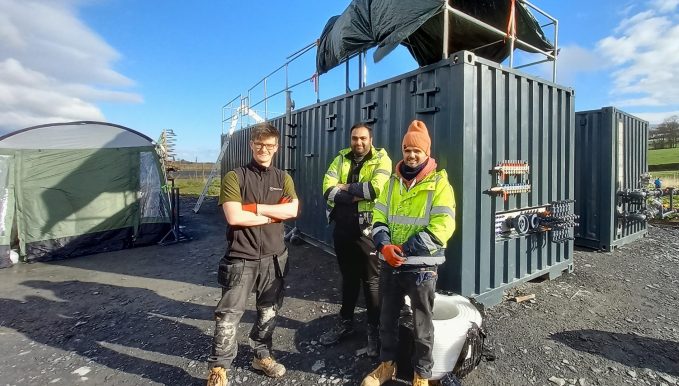The land-based college is making progress with plans for a carbon neutral farm and this year unveiled a raft of net-zero initiatives, including a revolutionary biofactory that will support Welsh farmers in reducing greenhouse gas emissions.
The anaerobic digestion system was unveiled by Biofactory Energy and is one of three low-carbon initiatives jointly funded by a £500,000 grant from Welsh Government via its Whole System Business Research Innovation for Decarbonisation Challenge (WBRID).
As all Animal Care courses are now delivered at Northop, Llysfasi has sharpened its focus on agriculture, enabling the site to continue moving forward as a first-class, sustainable education provider for students and the community.
Elin Roberts, Head of Llysfasi, said: “We have capitalised on a raft of innovative ‘green’ ideas and projects to lead the next generation of net zero farming, in line with UK and Welsh Government targets.
“The advances in technology are incredible, and Cambria is at the forefront of developments, introducing concepts that will benefit both our learners and the sector.
“Over the next decade and more the college will continue to pioneer new ideas and machinery in digital and precision agriculture and renewable energy, and become a beacon of best practice, working in partnership with organisations nationwide to ensure the industry is in a strong position moving forward.”
She added: “This is an exciting time to be here at Llysfasi, whether that’s as a student or one of our skilled, dedicated staff, who are embracing ways to improve efficiency, production and land management, and reduce emissions.
“The foundations are being laid and we are pleased with the progress so far.”
Earlier this year, the biofactory was unveiled by Cambria and Biofactory Energy, manufactured from two shipping containers that had been transformed into a prototype plant.
Named Neli and Gobaith (Hope) by students at the college, the long-term aim is for dairy farms to decrease emissions from slurry management using the technology, and for the system to become commercially viable and applicable to as many farmers as possible.
“It is one of several developments we are working on in tandem with leading names in the agriculture arena and will have a major impact on the future of the industry in Wales,” said Elin.
The dairy farming industry is pivotal to North Wales, employing 7% of the workforce and contributing more than £370m to the economy each year.
Visit www.cambria.ac.uk for more news and information from Coleg Cambria Llysfasi.
